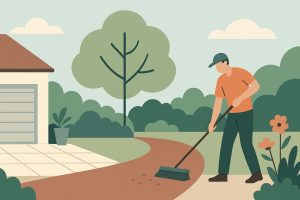An uneven driveway can be both unsightly and hazardous. Over time, weather conditions, wear and tear, and even soil movement can cause driveways to become bumpy, cracked, or sunken. Whether you’re dealing with minor surface issues or significant structural damage, it’s important to address these problems promptly to avoid further deterioration. In this blog, we’ll explore some effective uneven driveway solutions, along with various resurfacing options and costs to help you make an informed decision about improving your driveway.
Common Causes of Uneven Driveways
Before delving into the best resurfacing solutions, it’s essential to understand what might be causing your driveway to become uneven. Here are some of the most common factors:
- Soil Erosion: Over time, rainwater can erode the soil beneath your driveway, causing it to settle unevenly. This is especially true in areas with poor drainage systems.
- Tree Roots: Large trees with extensive root systems can disrupt the foundation of your driveway as the roots grow and push against the surface.
- Freeze-Thaw Cycles: In colder climates, the freeze-thaw cycle can cause the ground to expand and contract, leading to cracks and uneven surfaces.
- Poor Installation: If your driveway wasn’t installed properly with the right foundation and materials, it’s more likely to develop problems over time.
Uneven Driveway Solutions: Resurfacing Options
Fortunately, there are several options available to fix an uneven driveway, ranging from minor repairs to complete resurfacing. Each solution varies in terms of cost and longevity, so it’s important to choose the right one for your situation.
1. Asphalt Resurfacing
Asphalt resurfacing is one of the most popular options for addressing uneven driveways. This process involves applying a new layer of asphalt over the existing surface, effectively filling in cracks and evening out bumps. Asphalt is durable, affordable, and provides a smooth finish.
Pros:
- Affordable compared to other materials
- Quick to install
- Smooth and professional appearance
Cons:
- May not be suitable for driveways with severe structural damage
- Requires regular maintenance and resealing every few years
2. Concrete Resurfacing
Concrete resurfacing is another durable option for uneven driveways. This method involves applying a thin layer of new concrete over the old surface to restore its level and smoothness. Concrete is known for its long lifespan and can be customised with different finishes and textures to enhance your driveway’s appearance.
Pros:
- Long-lasting and low maintenance
- Can be customised with patterns or colours
- Resistant to weather and heavy use
Cons:
- Higher upfront cost compared to asphalt
- Takes longer to cure and become fully usable
3. Block Paving Repair and Levelling
For driveways made of block paving, levelling the surface involves lifting and resetting individual blocks that have sunk or shifted. This method is ideal if only certain sections of your driveway are uneven, as you can target the affected areas without having to replace the entire driveway.
Pros:
- Targeted repairs minimise disruption
- Blocks can be reused, making it a more sustainable option
- Long-lasting with proper maintenance
Cons:
- Labour-intensive, which can increase costs for larger areas
- Requires regular maintenance to prevent future shifting
4. Gravel Driveway Levelling
If you have a gravel driveway that’s become uneven, levelling it is relatively simple and affordable. This process involves spreading new gravel over the surface to fill in dips and restore an even surface. Gravel is a cost-effective solution but requires regular maintenance to keep it looking its best.
Pros:
- Affordable and easy to install
- Ideal for large driveways
- Allows for natural drainage
Cons:
- Requires frequent raking and replenishing of gravel
- Not as smooth or durable as asphalt or concrete
5. Full Driveway Replacement
In cases where your driveway is beyond simple repairs or resurfacing, a full replacement may be the best solution. This involves completely removing the old driveway and installing a new one from scratch. While more expensive, a new driveway can significantly improve the aesthetics and functionality of your property.
Pros:
- Provides a brand-new, long-lasting surface
- Can improve the value and curb appeal of your property
- Allows you to choose a new material or design
Cons:
- High upfront cost
- Time-consuming and disruptive
How to Choose the Best Solution for Your Driveway
The best resurfacing solution for your driveway will depend on factors such as the extent of the damage, the material of your current driveway, and your budget. Minor cracks and surface issues can often be fixed with resurfacing, while more significant problems may require a full replacement.
If you’re unsure which option is right for your driveway, it’s a good idea to consult with a professional landscaping or driveway specialist. They can assess the condition of your driveway and recommend the most cost-effective solution based on your needs.
Conclusion
An uneven driveway not only detracts from your home’s appearance but can also pose a safety hazard. Whether you opt for resurfacing or a full replacement, addressing driveway issues early on can save you money in the long run and improve your property’s overall appeal.
If you need help fixing your uneven driveway, our team at Mammoth Services Ltd is here to assist. We offer a range of driveway services in Hazlemere, tailored to meet your needs and budget. Contact us today for a consultation and get your driveway back to looking its best.

